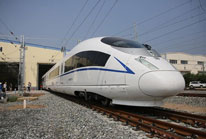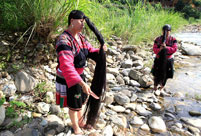

SEOUL, Aug. 29 (Xinhua) -- Calls rose in South Korea for introducing a nuclear-powered submarine in response to the Democratic People's Republic of Korea (DPRK)'s advance in technology of submarine-launched ballistic missiles (SLBM).
Rep. Chung Jin-suk, floor leader of the ruling Saenuri Party, said during a party meeting on Monday that the DPRK's SLBM launch is a severe threat to security in South Korea as well as Northeast Asia because it is harder to detect where SLBMs are fired than ground-based missiles.
Chung asked the military authorities to review special countermeasures, including the nuclear-powered submarine deployment, to fundamentally contain the DPRK's SLBMs.
His comments came after the DPRK test-fired a ballistic missile from a submarine off its east coast on Aug. 24. Seoul's military said the missile flew about 500 km toward Japan, surpassing the flight distance of 300 km which South Korean defense ministry regards as a success.
Adding to the call, former Saenuri floor leader Won Yoo-chul appeared in a radio program saying that a nuclear-powered submarine should be deployed to contain possible SLBM provocations from the DPRK.
Won said the nuclear submarine is capable of conducting a close, persistent surveillance against DPRK submarines, which diesel-powered submarines, currently owned by South Korea's navy, are incapable of due to their shorter underwater time.
A group of 23 Saenuri lawmakers, headed by Won, issued a statement on Sunday to call for the nuclear-powered submarine deployment, according to Yonhap news agency report.
A completed SLBM technology would raise the DPRK's nuclear threat to a new level as it is very hard to detect and track a DPRK missile from a submarine moving secretly deep under the waters.
The SLBM would make worthless a U.S. missile shield, which Seoul and Washington have agreed to deploy on South Korean soil, as the system's X-band radar cannot trace DPRK missiles from a submarine.
The decision to install one Terminal High Altitude Area Defense(THAAD) battery by the end of next year encouraged Pyongyang to speed up efforts at advancing its SLBM technology. Just a day after the decision was announced on July 8, the DPRK test-fired an SLBM to protest against it.
Facing strong oppositions from residents and politicians, Seoul's defense ministry said it would reconsider where the U.S. missile defense battery is sited only inside Seongju county, some250 km southeast of capital Seoul.
Rep. Choo Mi-ae, newly elected chairwoman of the main opposition Minjoo Party, said on Saturday that she would push to make clear the party's objection to the THAAD deployment by adopting it as an official party view. Her comments were made after she was elected as the party head.
Calls for a nuclear-powered submarine here are expected to escalate the already heightened tensions in the region. Tensions mounted following Pyongyang's nuclear test in January and the launch in February of a long-range rocket.
Seoul responded by shutting down Kaesong Industrial Complex, the last remaining inter-Korean economic cooperation project in the DPRK's border town, and resuming its propaganda broadcasts through loudspeakers in frontline units.
Combined forces of the United States and South Korea carried out their joint annual springtime war games, codenamed Key Resolve and Foal Eagle, for about two months through late April despite the DPRK's strong denunciations.
Pyongyang made overtures in early 2015 that it would suspend nuclear tests in return for a halt of U.S.-South Korea war games ahead of last year's Key Resolve and Foal Eagle exercises. However, it was flatly denied by Seoul and Washington.
The allies kicked off Ulchi Freedom Guardian (UFG) computer-simulated exercise on Aug. 22, mobilizing tens of thousands of forces. The war game, which Pyongyang calls a dress rehearsal for northward invasion, will run through Friday.
Just two days after the UFG exercise started, the DPRK conducted another test of an SLBM. Rather than turning its focus into peace talks with the DPRK, South Korea strengthened its super hard-line policy. Enditem
 World's fastest bullet train to start operating next month
World's fastest bullet train to start operating next month Huangluo: China's 'long hair village'
Huangluo: China's 'long hair village' Spectacular bridge with one of the tallest piers in the world
Spectacular bridge with one of the tallest piers in the world Magnificent view of Hukou Waterfall
Magnificent view of Hukou Waterfall A glimpse of Stride 2016 Zhurihe B military drill
A glimpse of Stride 2016 Zhurihe B military drill US Navy chief tours Liaoning aircraft carrier
US Navy chief tours Liaoning aircraft carrier Chinese American woman wins Miss Michigan
Chinese American woman wins Miss Michigan Centenarian couple takes first wedding photos
Centenarian couple takes first wedding photos Traditional Tibetan costumes presented during fashion show
Traditional Tibetan costumes presented during fashion show Top 10 livable Chinese cities
Top 10 livable Chinese cities Top 20 hottest women in the world in 2014
Top 20 hottest women in the world in 2014 Top 10 hardest languages to learn
Top 10 hardest languages to learn China’s Top 10 Unique Bridges, Highways and Roads
China’s Top 10 Unique Bridges, Highways and Roads Sino-US ties will be shaped by interactions
Sino-US ties will be shaped by interactions Human remains, pottery found in China's 4-millennia Dongzhao Ruins
Human remains, pottery found in China's 4-millennia Dongzhao Ruins Olympic team charms HK
Olympic team charms HK Teenagers left traumatized by ‘electroshock therapy’
Teenagers left traumatized by ‘electroshock therapy’Day|Week